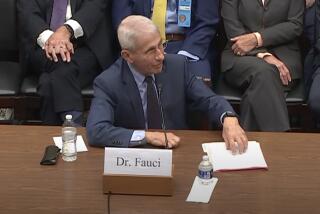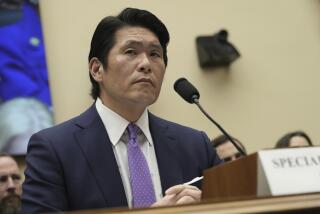Probers Question Poindexter’s Story About Diversion
- Share via
WASHINGTON — As former National Security Adviser John M. Poindexter concluded a second day of testimony Thursday, some members of the congressional Iran- contra committees questioned the credibility of his story that he never told President Reagan about the diversion of profits from the Iran arms sales to the Nicaraguan rebels.
Most of Poindexter’s congressional critics cited specific aspects of his testimony that seemed implausible to them. But Rep. Louis Stokes (D-Ohio), who also chairs the House Intelligence Committee, was much broader in criticism, saying that the overall account “does not square with me.”
“I don’t believe it,” Stokes said as the hearing adjourned. “I just don’t believe it.”
Stokes explained that he could not accept the assertion that Poindexter, a Navy rear admiral who was well-known for operating strictly by the book, would make such an important decision without at least consulting someone else in the White House.
Statement ‘Absurd’
“It does not appear logical that a man of his intellect and management skills would arrogate unto himself the responsibility of making what he himself describes as a monumental decision affecting the President of the United States,” he said. “His statement that ‘the buck stops here’ is absurd.”
Similarly, Sen. William S. Cohen (R-Me.) told reporters that he could not believe Poindexter’s contention that the diversion of funds was not an important enough issue to bring to the attention of the President.
Sen. George J. Mitchell (D-Me.) added that he could not understand why Poindexter had kept his story secret for so long.
“If his primary motive was simply to protect the President, why didn’t he say last November what he said yesterday?” Mitchell asked.
In his testimony, Poindexter, who resigned last Nov. 25, the day that the diversion of funds was disclosed by Atty. Gen. Edwin Meese III, expressed regret that he had not spoken out earlier. He said he kept quiet for seven months on his attorney’s advice.
“I think with hindsight some mistakes were made in terms of handling the issue in November, and I think that in the effort to make sure that the White House was not accused of cover-up that we moved too fast,” Poindexter said. “I don’t think with hindsight that I should have resigned when I did. We should have stayed around to get a full explanation as to what we were trying to do and the reasons.”
Cohen said Poindexter’s testimony is credible in light of his expressed obsession with secrecy. But the senator quickly added: “What is lacking in credibility, in my judgment, is the statement that this was a mere technicality. This involves the sale of U.S. property, taxpayer-owned property, at inflated prices for the purpose of funding a program that was expressly rejected by the Congress. That cannot be classified or characterized as a mere technicality.
“I think they fully understood this was a politically explosive, volatile issue.”
Likewise, Mitchell said he will withhold final judgment on whether the witness is telling the truth until his testimony is completed next week. But he acknowledged that members of the committee cannot help but question Poindexter’s credibility, especially because he has admitted misleading Congress in the past.
“How do you know?” he asked.
Poindexter flatly denied a suggestion by Arthur L. Liman, chief counsel for the Senate investigating committee, that he decided to be what his former subordinate, Lt. Col. Oliver L. North, has described as the “fall guy” for the Iran-contra affair.
In acknowledging that North frequently offered to be “sacrificed” if his exploits ever became public, Poindexter said he had rejected any such idea. “I was not a party to any plan to make Col. North or to make me, for that matter, a scapegoat,” he said.
Fate Was Sealed
Poindexter said his fate was sealed in February, 1986, when he decided not to tell the President about the diversion. “I accepted that responsibility then and knew that if it became public I would have to leave--simple as that,” he said.
He also disclosed for the first time that when he tendered his resignation to the President on Nov. 25, Reagan asked no questions, telling him only that his decision to accept responsibility was “in the tradition of a naval officer.”
Committee members have been troubled by Poindexter’s testimony in large part because it seems to run counter to his reputation as a fastidious bureaucrat with a keen mind and a penchant for detail.
From the time he was graduated first in his Naval Academy class in 1958, Poindexter had risen through naval ranks by following orders, by never taking a chance that his actions might be against his superiors’ wishes. His associates have said he was not a person who would act without authorization.
Retired Rear Adm. Clarence Hill Jr., who served with Poindexter during the 1960s on the Pentagon staff and who now runs his legal defense fund, described Poindexter’s work habits to The Times several months ago: “There was no stone left unturned to keep the right people informed.”
Decision Never Recorded
Liman noted that Poindexter never recorded his decision not to tell the President.
“You created a situation where it would be only your word to corroborate that of our commander-in-chief,” Liman said.
“That is correct,” Poindexter replied.
Liman also asked why Poindexter had never asked how much money the Nicaraguan resistance was receiving--even though he attended a meeting last year with other top Administration officials to discuss their plans to seek donations from other countries.
“I had a rough idea of the amount of money involved,” Poindexter replied. “But, with all of the other issues that I was involved with during the year, I simply didn’t get into that detail of micro-management of the project that Col. North was working on. I’ve told you that was not my style.”
Poindexter was also questioned at length by Liman about his memory lapse he claims to have had last November about the details of the Administration’s support for a late 1985 Israeli shipment of U.S.-made arms to Iran. He said he could not remember whether Reagan had approved the shipment, even though his first act as national security adviser on Dec. 7, 1985, had been to get the President to sign a document approving it retroactively.
It was this document--known as a presidential “finding”--that Poindexter destroyed last Nov. 21 after he learned that Meese had launched an inquiry into the Iran affair.
A man who takes pride in his sharp memory, Poindexter said he could not explain this lapse. “I have a reasonably good memory but . . . up until my year as national security adviser, I have never been hit with so many issues in such a short period of time,” he said.
Poindexter’s loss of memory occurred shortly after the Iranian initiative became public last November, as Administration officials began to face a torrent of questions about it from the press and the Congress. At the time, he said, there was “some confusion” within the Administration itself about what had occurred a year earlier.
He said he knew that a chronology of events prepared by North at the time was wrong because it claimed that the U.S. government was unaware of the 1985 Israeli shipments. “The problem was, I didn’t know what was accurate,” he explained.
Poindexter acknowledged that he told members of Congress last Nov. 21 that officials in the U.S. government believed that the 1985 shipment contained oil-drilling equipment and did not learn that the cargo was weapons until January, 1986. His briefing for members of Congress was similar to the testimony given that same day by the late CIA Director William J. Casey.
Matter of Confusion
But Poindexter insisted that it was simply a matter of confusion, not a concerted Administration effort to cover up the truth. “My intent was to put out accurate information, and I thought that I did,” he said.
Poindexter’s motives for tearing up what he believed to be the only existing copy of the first draft of the presidential finding also were challenged. On Wednesday, Poindexter testified that he destroyed the draft because it portrayed the Iran initiative as a straight arms-for-hostages deal and would have embarrassed Reagan.
Chief House counsel John W. Nields Jr., noting that Poindexter destroyed the finding just as the Meese’s inquiry commenced, asked: “Do you know of any document in your possession, or in Col. North’s, that was more directly relevant to the attorney general’s inquiry? . . . It was your intent, when you destroyed that document, that no one would see the document?”
Poindexter replied: “Any time a document left my office, I was concerned that it was susceptible to public exposure. I simply did not want this document to see the light of day.”
House Majority Leader Thomas S. Foley (D-Wash.), speaking to reporters after the hearing adjourned, expressed outrage at Poindexter’s action.
No ‘Justification’ Seen
“I don’t think there’s any conceivable justification . . . for destroying documents that record presidential decisions,” Foley said. “Destroying the document to avoid political embarrassment is even more questionable.
Even conservative Republicans, who were pleased that Poindexter had cleared the President of any knowledge of the diversion, questioned his judgment in destroying documents.
“His judgment has been flawed,” Rep. Henry J. Hyde (R-Ill.) said. “Destroying documents is a serious business. I don’t think it can be glossed over.”
Sen. Warren B. Rudman (R-N.H.) described the testimony with one word: “chilling.”
More to Read
Get the L.A. Times Politics newsletter
Deeply reported insights into legislation, politics and policy from Sacramento, Washington and beyond. In your inbox twice per week.
You may occasionally receive promotional content from the Los Angeles Times.










